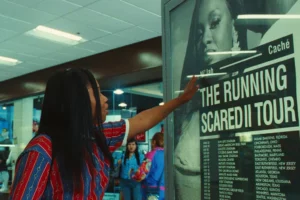Entertainment | April 17th, 2023
Swarm and the Hive Mind
By: Cordell Jones

“Swarm,” the Donald Glover-produced “sister” show to the popular FX series “Atlanta,” was released on March 17. The limited series chronicles the journey of Texas native Dre, played by Dominique Fishback, to meet her idol: Ni’jah.
The show, which features actors like Damson Idris and Paris Jackson to famous musicians like Chloë Bailey and Billie Eilish, depicts Dre going on a murderous rampage for multiple years in defense of Ni’jah, as well as those who talk about her sister Marissa (played by Bailey), who tragically took her life in the first episode.
The show’s idol spares no liberties in showcasing that she is heavily inspired by Beyoncé, down to the fan base that Dre is involved in, the Swarm, an active and rampant fan base that defends their artist by any means necessary.

Screencap of Domonique Fishback as Dre looking at Nijah’s “The Running Scared II” poster in Episode 4 of “Swarm” | Photo Credit: PopSugar
A clear example of the influence Beyoncé had in the show occurred in the fourth episode, titled “Running Scared,” where Dre looks at a poster in a mall that resembles that of Beyoncé and Jay-Z’s “On the Run II” tour poster.
Another blatant example of their influence would be the show’s usage of the rumored incident of Beyoncé getting bitten at a party she attended in 2018.
The show’s creators claim the series to be a satirical thriller, but every episode starts with a disclaimer saying the show depicts “true events.”
Regardless of this contradiction, the show takes viewers on a whirlwind journey through Dre’s life.
The show shows glimpses of the fans that stick beside Ni’Jah through all social media platforms and through Dre’s personal life being a fan.
Fanbases like the Hive (the primary foundation for the Swarm in the show), the Barbz, and the Navy, among others, possess these para-social relationships with celebrities that happen to fans.
According to Aisha Harris’s NPR review of the show, “Swarm seems to want viewers to recognize a bit of themselves in Dre – the part that might put a little too much stock in celebrity, the part that may occasionally forget that everyone, including those strangers you argue with on the internet, is human, too.”
Within our current day, social media fandoms tend to latch onto these celebrities and insert their lives into their own. Though there hasn’t been a situation similar to Dre’s in the show, it doesn’t feel too far off in the realm of possibility to happen soon. However, what should be known is that in Dre’s case, her actions were caused by personal reasons and not fueled by the star she fans over.
Joelle Anderson, a second-year Professional Master of Business Administration candidate, discusses how the show talks more about Dre and not the fanbase, which she is a minor part of, at large.
“I feel like Swarm wasn’t a representative of stan culture as she’s a unique case of hysteria,” Anderson said. “She took her actions based on past experiences, not fueled by the Swarm itself. Swarm was a good thriller for what it was, but in terms of speaking about stan culture, the point was missed. The show follows Dre and not the Swarm she is a part of.”
Some outlets also stand on how the show paints Dre and the fanbase she’s a part of as a piece of media that dehumanizes black women.
In a Teen Vogue op-ed by culture writer Stitch regarding the show, they discuss how Donald Glover paints the show to be based on actual events when most of the events depicted within the series are rumors or alleged acts, all not done by fans.
They discuss how the show, with its attempts to show Dre and the Swarm naturally, only seems to misrepresent it and highlight it at a broadly more toxic level than what a fan base might be in real life.
The show has been met with many reviews from fanbases and tv watchers alike for its portrayal of Dre and the Swarm she is in. One thing is sure, though told each episode to be based on “true events,” no one, fan or not, is Dre.






